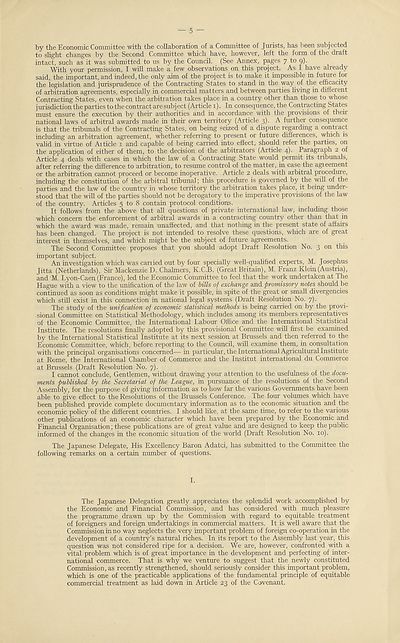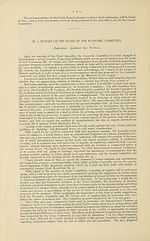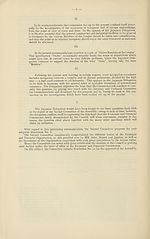Download files
Complete book:
Individual page:
Thumbnail gallery: Grid view | List view

5
by the Economic Committee with the collaboration of a Committee of Jurists, has been subjected
to slight changes by the Second Committee which have, however, left the form of the draft
intact, such as it was submitted to us by the Council. (See Annex, pages 7 to 9).
With your permission, I will make a few observations on this project. As I have already
said, the important, and indeed, the only aim of the project is to make it impossible in future for
the legislation and jurisprudence of the Contracting States to stand in the way of the efficacity
of arbitration agreements, especially in commercial matters and between parties living in different
Contracting States, even when the arbitration takes place in a country other than those to whose
jurisdiction the parties to the contract are subject (Article 1). In consequence, the Contracting States
must ensure the execution by their authorities and in accordance with the provisions of their
national laws of arbitral awards made in their own territory (Article 3). A further consequence
is that the tribunals of the Contracting States, on being seized of a dispute regarding a conti act
including an arbitration agreement, whether referring to present or future differences, which is
valid in virtue of Aiticle 1 and capable of being carried into effect, should refer the parties, on
the application of either of them, to the decision of the arbitrators (Article 4). Paragraph 2 of
Article 4 deals with cases in which the law of a Contracting State would permit its tribunals,
after referring the difference to arbitration, to resume control of the matter, in case the agieement
or the arbitration cannot proceed or become inoperative. Article 2 deals with arbitral procedure,
including the constitution of the arbitral tribunal; this procedure is governed by the will of the
parties and the law of the country in whose territory the arbitration takes place, it being under¬
stood that the will of the parties should not be derogatory to the imperative provisions of the law
of the country. Articles 5 to 8 contain protocol conditions.
It follows from the above that all questions of private international law, including those
which concern the enforcement of arbitral awards in a contracting country other than that in
which the award was made, remain unaffected, and that nothing in the present state of affairs
has been changed. The project is not intended to resolve these questions, which are of great
interest in themselves, and which might be the subject of future agreements.
The Second Committee proposes that you should adopt Draft Resolution No. 3 on this
important subject.
An investigation which was canied out by four specially well-qualified experts, M. Josephus
Jitta (Netherlands), Sir Mackenzie D. Chalmers, K.C.B. (Great Britain), M. Franz Klein (Austria),
and M. Lyon-Caen (France), led the Economic Committee to feel that the work undertaken at Ihe
Hague with a view to the unification of the law of bills of exchange and 'promissory notes should be
continued as soon as conditions might make it possible, in spite of the great or small divergencies
which still exist in this connection in national legal systems (Draft Resolution No. 7).
The study of the unification of economic statistical methods is being carried on by the provi¬
sional Committee on Statistical Methodology, which includes among its members representatives
of the Economic Committee, the International Labour Office and the International Statistical
Institute. The resolutions finally adopted by this provisional Committee will first be examined
by the International Statistical Institute at its next session at Brussels and then referred to the
Economic Committee, which, before reporting to the Council, will examine them, in consultation
with the principal organisations concerned— in particular, the International Agricultural Institute
at Rome, the International Chamber of Commerce and the Institut international du Commerce
at Brussels (Draft Resolution No. 7).
I cannot conclude, Gentlemen, without drawing your attention to the usefulness of the docu¬
ments published by the Secretariat of the League, in pursuance of the resolutions of the Second
Assembly, for the purpose of giving information as to how far the various Governments have been
able to give effect to the Resolutions of the Brussels Conference. The four volumes which have
been published provide complete documentary information as to the economic situation and the
economic policy of the different countries. I should like, at the same time, to refer to the various
other publications of an economic character which have been prepared by the Economic and
Financial Organisation; these publications are of great value and are designed to keep the public
informed of the changes in the economic situation of the world (Draft Resolution No. 10).
The Japanese Delegate, His Excellency Baron Adatci, has submitted to the Committee the
following remarks on a certain number of questions.
I.
The Japanese Delegation greatly appreciates the splendid work accomplished by
the Economic and Financial Commission, and has considered with much pleasure
the programme drawn up by the Commission with regard to equitable treatment
of foreigners and foreign undertakings in commercial matters. It is well aware that the
Commission in no way neglects the very important problem of foreign co-operation in the
development of a country’s natural riches. In its report to the Assembly last year, this
question was not considered ripe for a decision. We are, however, confronted with a
vital problem which is of great importance in the development and perfecting of inter¬
national commerce. That is why we venture to suggest that the newly constituted
Commission, as recently strengthened, should seriously consider this important problem,
which is one of the practicable applications of the fundamental principle of equitable
commercial treatment as laid down in Article 23 of the Covenant.
by the Economic Committee with the collaboration of a Committee of Jurists, has been subjected
to slight changes by the Second Committee which have, however, left the form of the draft
intact, such as it was submitted to us by the Council. (See Annex, pages 7 to 9).
With your permission, I will make a few observations on this project. As I have already
said, the important, and indeed, the only aim of the project is to make it impossible in future for
the legislation and jurisprudence of the Contracting States to stand in the way of the efficacity
of arbitration agreements, especially in commercial matters and between parties living in different
Contracting States, even when the arbitration takes place in a country other than those to whose
jurisdiction the parties to the contract are subject (Article 1). In consequence, the Contracting States
must ensure the execution by their authorities and in accordance with the provisions of their
national laws of arbitral awards made in their own territory (Article 3). A further consequence
is that the tribunals of the Contracting States, on being seized of a dispute regarding a conti act
including an arbitration agreement, whether referring to present or future differences, which is
valid in virtue of Aiticle 1 and capable of being carried into effect, should refer the parties, on
the application of either of them, to the decision of the arbitrators (Article 4). Paragraph 2 of
Article 4 deals with cases in which the law of a Contracting State would permit its tribunals,
after referring the difference to arbitration, to resume control of the matter, in case the agieement
or the arbitration cannot proceed or become inoperative. Article 2 deals with arbitral procedure,
including the constitution of the arbitral tribunal; this procedure is governed by the will of the
parties and the law of the country in whose territory the arbitration takes place, it being under¬
stood that the will of the parties should not be derogatory to the imperative provisions of the law
of the country. Articles 5 to 8 contain protocol conditions.
It follows from the above that all questions of private international law, including those
which concern the enforcement of arbitral awards in a contracting country other than that in
which the award was made, remain unaffected, and that nothing in the present state of affairs
has been changed. The project is not intended to resolve these questions, which are of great
interest in themselves, and which might be the subject of future agreements.
The Second Committee proposes that you should adopt Draft Resolution No. 3 on this
important subject.
An investigation which was canied out by four specially well-qualified experts, M. Josephus
Jitta (Netherlands), Sir Mackenzie D. Chalmers, K.C.B. (Great Britain), M. Franz Klein (Austria),
and M. Lyon-Caen (France), led the Economic Committee to feel that the work undertaken at Ihe
Hague with a view to the unification of the law of bills of exchange and 'promissory notes should be
continued as soon as conditions might make it possible, in spite of the great or small divergencies
which still exist in this connection in national legal systems (Draft Resolution No. 7).
The study of the unification of economic statistical methods is being carried on by the provi¬
sional Committee on Statistical Methodology, which includes among its members representatives
of the Economic Committee, the International Labour Office and the International Statistical
Institute. The resolutions finally adopted by this provisional Committee will first be examined
by the International Statistical Institute at its next session at Brussels and then referred to the
Economic Committee, which, before reporting to the Council, will examine them, in consultation
with the principal organisations concerned— in particular, the International Agricultural Institute
at Rome, the International Chamber of Commerce and the Institut international du Commerce
at Brussels (Draft Resolution No. 7).
I cannot conclude, Gentlemen, without drawing your attention to the usefulness of the docu¬
ments published by the Secretariat of the League, in pursuance of the resolutions of the Second
Assembly, for the purpose of giving information as to how far the various Governments have been
able to give effect to the Resolutions of the Brussels Conference. The four volumes which have
been published provide complete documentary information as to the economic situation and the
economic policy of the different countries. I should like, at the same time, to refer to the various
other publications of an economic character which have been prepared by the Economic and
Financial Organisation; these publications are of great value and are designed to keep the public
informed of the changes in the economic situation of the world (Draft Resolution No. 10).
The Japanese Delegate, His Excellency Baron Adatci, has submitted to the Committee the
following remarks on a certain number of questions.
I.
The Japanese Delegation greatly appreciates the splendid work accomplished by
the Economic and Financial Commission, and has considered with much pleasure
the programme drawn up by the Commission with regard to equitable treatment
of foreigners and foreign undertakings in commercial matters. It is well aware that the
Commission in no way neglects the very important problem of foreign co-operation in the
development of a country’s natural riches. In its report to the Assembly last year, this
question was not considered ripe for a decision. We are, however, confronted with a
vital problem which is of great importance in the development and perfecting of inter¬
national commerce. That is why we venture to suggest that the newly constituted
Commission, as recently strengthened, should seriously consider this important problem,
which is one of the practicable applications of the fundamental principle of equitable
commercial treatment as laid down in Article 23 of the Covenant.
Set display mode to:
![]() Universal Viewer |
Universal Viewer | ![]() Mirador |
Large image | Transcription
Mirador |
Large image | Transcription
Images and transcriptions on this page, including medium image downloads, may be used under the Creative Commons Attribution 4.0 International Licence unless otherwise stated. ![]()
| League of Nations > Economic and financial section > Economic and Financial Commission > (5) |
|---|
| Permanent URL | https://digital.nls.uk/191785847 |
|---|
| Shelfmark | LN.II |
|---|
| Description | Over 1,200 documents from the non-political organs of the League of Nations that dealt with health, disarmament, economic and financial matters for the duration of the League (1919-1945). Also online are statistical bulletins, essential facts, and an overview of the League by the first Secretary General, Sir Eric Drummond. These items are part of the Official Publications collection at the National Library of Scotland. |
|---|---|
| Additional NLS resources: |
|

